► We rank the fastest electric cars in the world
► Spoiler alert – they’re much quicker than petrol cars
► The fastest can get from 0–62mph in under two seconds
Electric supercars are the new speed kings. The very best electric cars are now quick enough to keep pace with Formula One racers in the 0–62mph sprint, thanks to their devastating blend of immense power and instant torque delivery.
The rate of change has been rapid, too. At the start of the 2020s, most of the fastest cars on sale were still powered by combustion engines. But now, even electric SUVs (like the 1000hp Tesla Model X Plaid) are outstripping the best supercars in a straight line.
In fact, Tesla illustrates the speed of progress for performance EVs quite well. The range-topping Model S Performance P100D was a blisteringly fast car when it was launched in 2017, boasting a 0–60mph time of around 2.4 seconds. Then, just when we thought the car couldn’t get any faster, Elon Musk unveiled the Model S Plaid in 2021 with a staggering 1006bhp and 0–60mph time of under two seconds.
The best at a glance:
To demonstrate how far performance electric cars have come, we’ve compiled a list of the fastest EVs in the world. Our run-down mainly focuses on cars that are either on sale now or will be soon – and we’ve organised it by their 0–62mph (or 0–60mph) times. For fun, we’ve also included a couple of electric prototype race cars that you can’t buy but which have some deeply impressive performance figures. Buckle up…
The fastest EVs of 2024
McMurtry Speirling
Prototype racer claimed the outright hillclimb record at Goodwood
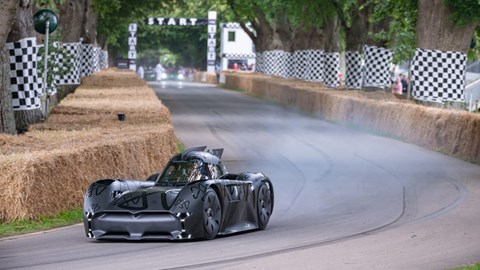
Pros: Record-setting speed, massive downforce, clever tech
Cons: You can’t buy one, hideously impractical
We’re kicking our list off with a car you couldn’t buy even if you’re Mark Zuckerburg – the McMurtry Spéirling. It’s a tiny single-seat electric racer that smashed the outright hillclimb record at the 2022 Goodwood Festival of Speed, stealing the crown from the Volkswagen ID. R. It can also sprint from 0–62mph in 1.5 seconds and hit a top speed of 150mph.
It’s so fast because it has 1000bhp, and it weighs about the same as a basket of feathers. Its record-setting performance at Goodwood was also partly due to its unusual downforce-generating fan, which works in the same way as system found on the infamous Brabham BT46B Formula One car.
The Spéirling’s fan can generate 2000kg of downforce when the car is standing still, which is double the car’s kerb weight. In theory, that means it could stick itself to the roof of the Dartford tunnel without moving. McMurtry also added some traditional aero appendages to balance the front and rear in the corners.
Find out more about the McMurtry Spéirling
Aspark Owl
This is still the fastest-accelerating road-legal car in the world
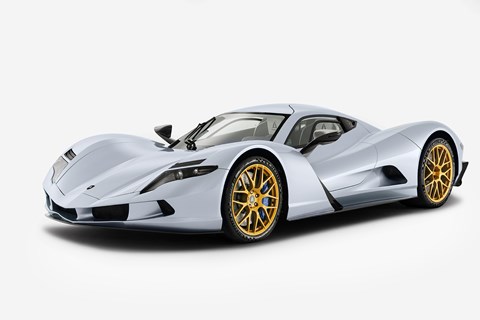
Pros: Savage speed, reasonable range, completely road legal!
Cons: Incredibly limited production run, frightening price
Aspark launched the Owl back in 2020 with the bold claim that it was the fastest-accelerating car in the world. We’re three years into the future now, and only one company (McMurtry) has managed to build a car that can outstrip it. But the Spéirling is a race car – so Aspark can draw comfort from the fact that nothing else with a licence plate can escape the Owl.
The Owl is powered by a compact 64kWh battery pack and four electric motors, delivering a combined output of almost 2000bhp. That’s a lot of power – and it isn’t like it has much weight to haul around because the Owl’s bodywork is hewn from carbon fibre. So, 0–60mph is dealt with in 1.69 seconds, 0–186mph takes 10.9 seconds, and top speed is 249mph.
To put these figures into perspective, Ferrari’s latest petrol-powered supercar, the 296 GTB, can cover the 0–60mph sprint in just under 3.0 seconds and tops out at 205mph. Scared yet? Aspark also says the Owl will can cover 280 miles on a single charge, but we must wonder just how gently you need to drive it to make its tiny battery go that far. The slippery body and a roofline that’s one whole inch lower than that of an original Ford GT40 may have something to do with it.
Find out more about the Aspark Owl
Rimac Nevera
Thunderous performance from an emerging leader in the EV space
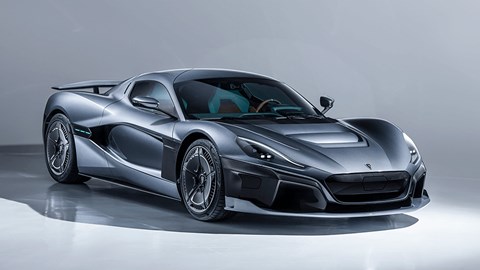
Pros: World-leading EV tech, record-setting speed, great to drive
Cons: Rather heavy and very expensive
The Nevera is the second car to come from Croatian EV manufacturer Rimac – and it’s as much a toy for wealthy drivers as it is a marketing project for the brand’s technology. After the car’s concept was unveiled at the 2018 Geneva Motor Show, Rimac signed electrification partnerships with the likes of Aston Martin, Koenigsegg and Automobili Pininfarina. Then, in 2021, the company entered another joint venture with Porsche and Bugatti to develop the next generation of hyper EVs.
If the Nevera is anything to go by, world-beating performance is pretty much guaranteed. It has four electric motors producing 1888bhp and 1739lb ft of torque. Coupled with Rimac’s sophisticated launch control system, that’s enough for a 0–60mph time of 1.85 seconds.
Rimac also says the Nevera can reach 100mph in just 4.3 seconds, while 186mph is dealt with in 11.8 seconds. Take the car to a drag strip, and it’ll cover the quarter mile in 9.1 seconds – or, if you have a long runway at your disposal, you’ll be able to reach a top speed of 258mph. Rimac even set a reversing land speed record in the Nevera, posting a speed of 171mph.
Plus, if you press the accelerator a little lighter, Rimac reckons the Nevera will go 403 miles between charging stops. Which it should, considering its battery is an enormous 120kWh unit. You pay for the performance, though. Each Nevera costs around £2 million.
Find out more about the Rimac Nevera
Tesla Roadster
Huge performance promises from the original electric sports car maker
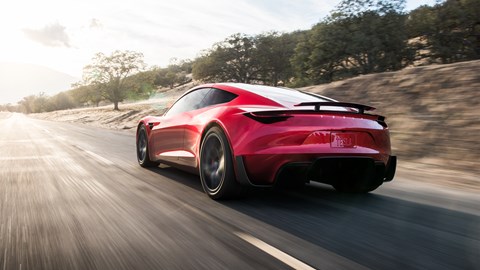
Pros: Rapid acceleration, enormous range, targa top
Cons: Doesn’t exist (yet), unproven performance
Tesla unveiled the second-generation Roadster way back in 2017, with the promise it would hit the showrooms in 2020. But it still hasn’t entered production yet. In May, the company’s CEO Elon Musk said the car would finally roll down the assembly lines next year – but he’s made the same promise for the past three years on the bounce, so naturally, we’re sceptical.
The delays haven’t stopped Musk from publicising the Roadster’s performance claims. He says the car will be able to sprint from 0–60mph in under two seconds and reach a top speed of more than 250mph, comfortably making it one of the fastest cars in the world. He also reckons it’ll have a maximum range of 620 miles, thanks to its gargantuan 200kWh battery pack.
Tesla isn’t content with simply being fast, though. It wants to crush its rivals, too. So, the firm says the Roadster will dash from 0–100mph in 4.2 seconds and tackle the quarter mile in just 8.8 seconds, both of which undercut the Rimac Nevera.
Like the rest of Tesla’s ultra-high-performance cars, the Roadster will have four-wheel drive and, like the original Tesla Roadster from the early 2000s, it’ll have a detachable roof. And unlike its rivals, the Roadster will almost enter the realm of affordability. UK prices for the limited-edition Founders Series (that’s Tesla’s name for its first-off-the-block cars) will start from £189,000. Reserving one now means you’ll have to cough up £38,000 upfront.
Find out more about the Tesla Roadster
Deus Vayanne
Austrian start-up brand aims to give its established rivals a good kicking
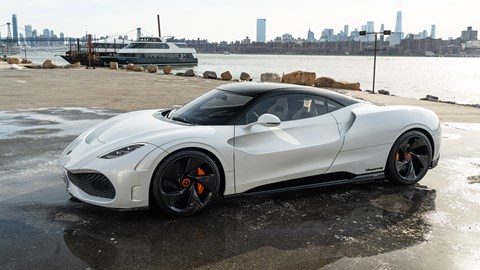
Pros: Looks great, goes fast, twice as much power as a Veyron
Cons: Unknown manufacturer, limited production
The who what now? Exactly – we were as surprised as you when the Deus Vayanne exploded onto the scene at the 2022 New York Auto Show. The company’s marketing types were frolicking around the car, making outlandish claims about its performance capability – and if it can meet those claims, it’ll give the likes of Tesla and Rimac something to worry about.
The Austrian start-up has positioned the Vayanne as a rival for the Lotus Evija and Aspark Owl, but in terms of power output, it has its rivals well and truly top-trumped. Deus has promised the Vayanne will have more than 2200bhp and 1475 lb-ft of torque. It also claims the car will be able to sprint from 0–62mph in ‘less than two seconds and reach a top speed of 248mph.
First deliveries aren’t set to arrive until 2025, so if you’re fortunate enough to afford one, you still have quite a wait before you can have it on your driveway. If you’re keen but haven’t yet placed your order, you’ll need to move quickly because Deus only plans to build 99 examples.
Find out more about the Deus Vayanne
Tesla Model S Plaid
It’s the most powerful electric family car you can buy
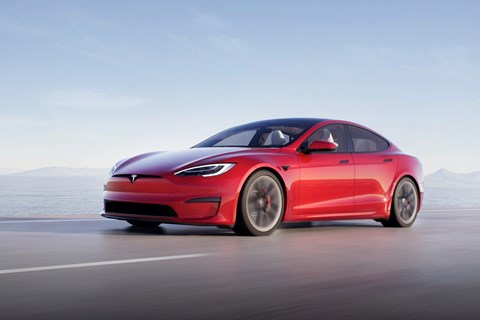
Pros: Comfortable ride, impressive safety tech, rapid charging
Cons: Unusual steering system, patchy build quality
The Tesla Model S has been around since 2012, and over the last decade, the firm’s engineers have constantly fiddled with the formula, launching variants with ever larger battery packs and ever more powerful electric motors. The Plaid is current king of the hill.
It produces a frankly ridiculous 1006bhp, which is enough for a 0–60mph time of less than two seconds. Allow us to frame those figures with some context. This family saloon has more power than a McLaren P1 and can sprint to 60mph faster than a Ferrari LaFerrari.
The maverick American EV brand wasn’t happy with that, though, and decided to chance the car’s luck on the track. The PR stunt didn’t go to plan, though. Elon Musk claimed on social media that an unmodified Tesla Model S Plaid lapped the Nürburgring in just over seven and half minutes, which is a new record for production EVs. Or at least it would be if the time was officially verified by an independent timer. Which it wasn’t.
Setting this rather wobbly record claim aside, the Plaid’s performance figures are still deeply impressive considering its vast dimension and two-tonne bulk. Tesla also says the car can cover 396 miles on a single charge and dispatch the quarter mile in 9.23 seconds. Sadly, you can’t get a new one in the UK anymore. It’s now a left-hand drive import or nothing.
To find out more, read our full Tesla Model S Plaid review
Automobili Pininfarina Battista
Savage speed from a legendary Italian design house
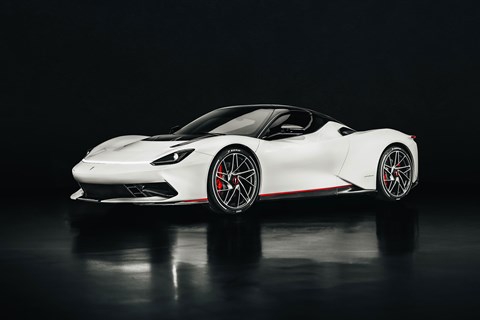
Pros: Stunning looks, impressive pedigree, great to drive
Cons: Narrow roads catch it out, limited production
The Automobili Pininfarina Battista is winner of CAR magazine’s inaugural ‘most syllables in a vehicle’s name’ award – and it’s easily one of the fastest cars on the road. However, because Pininfarina is known for its styling rather than its engineering, the company drafted in the experts and pinched the Rimac Nevera’s 120kWh battery pack and quartet of electric motors.
Because it was penned by Pininfarina (you know, the design house responsible for the likes of the Ferrari F40, Ferrari Enzo and Ferrari 458), the Battista features classic supercar styling. Most electric supercars look like the artistic intermingling of a 1950s streamliner and the Millenium Falcon, but the Battista has the archetypal short nose, long tail, low roofline and wide stance.
It’s also really rather fast. Its four electric motors have a combined output of 1877bhp, and Pininfarina says it’ll get from 0–60mph in less than two seconds before reaching a top speed of 217mph. If you’re prepared to baby it (which we certainly wouldn’t be), the company also says it can cover 280 miles between charges. It is quite a niche offering, though – just 150 examples will be built, each costing around £2 million. Maybe buy a lottery ticket and wish for some good fortune.
To find out more, read our full Automobili Pininfarina Battista review
Volkswagen ID. R
Volkswagen’s record-setting electric racer is still a performance king
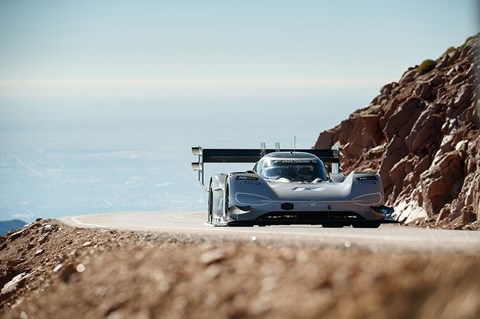
Pros: Multiple record holder, lightweight, eats corners for breakfast
Cons: You’d be locked up if you drove it on the road
The Volkswagen ID.R has been around since 2018. It was designed to be the ultimate pure-electric racer, and when it was launched, we were floored by its performance figures – but time has dulled its shine. There are six road-legal cars in this list that are faster than it in a straight line, which is a sobering indicator of how hard the winds of progress blow in the electric supercar game.
Still, there’s no arguing that the ID.R isn’t an immensely fast car. It only produces 671bhp, but because it weighs about the same as a carrier bag full of pocket lint, it can sprint from 0–62mph in 2.25 seconds. And all that aero means it can carry a biblical amount of speed through the corners.
In the years following its launch, the ID.R toured around the world, lapping up records as it went. For a while, it held the outright electric car record at the Nürburgring, Goodwood and Heavens Gate in China. So far, the only car to claim one of its titles is the McMurtry Spéirling.
Find out more about the Volkswagen ID.R
Faraday Future FF91
Unusual electric SUV with a preposterous amount of horsepower
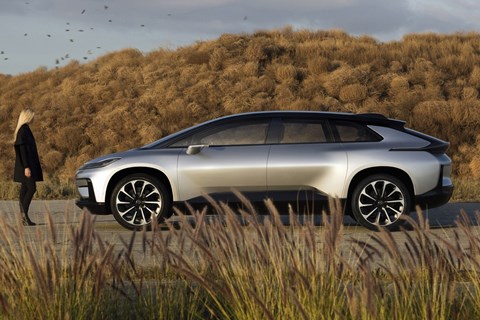
Pros: Svelte styling, luxurious interior, huge speed
Cons: Company suffers from volatile finances
It’s fair to say that EV start-up Faraday Future has had a tough time bringing its first car to market. Years of turmoil and a fair share of corporate controversy have cast doubt on the company’s ability to deliver more than once. The firm suffered even more hardship in early 2024, facing difficulties on the stock market and narrowly avoiding eviction from its LA headquarters.
Faraday Future has designed a very fast EV, though. The FF91 is a Tesla Model X-sized SUV but, rather than daft gullwing doors and space for seven, it features svelte lines and luxurious business-class-style seating. It’s also supposed to be blisteringly quick. Originally, Faraday Future said the car would have a 0–60mph time of 2.39 seconds, but the firm has since revised that estimation to 2.2 seconds.
That savage speed is thanks to a 1050bhp output. It should be usable over long distances, too. The motors are fed by a 142kWh battery pack, which Faraday Future says gives the car a maximum EPA range (the American equivalent of WLTP) of 381 miles. In this company, it doesn’t even look that expensive – the FF91 will have a price tag of between £90,000 to £170,000, depending on options.
Find out more about the Faraday Future FF91
Lucid Air
Space and pace from America’s latest electric saloon
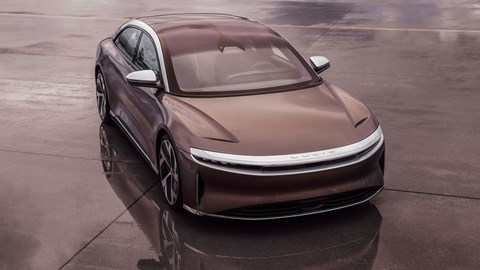
The Lucid Air is another all-American entrant for the electric saloon market – and it’s looking to give the Porsche Taycan a severe thrashing. The brand’s bosses say the top-spec Air Dream Edition will have an output of 1080bhp and a 0–62mph time of 2.5 seconds. That means this luxury limo is faster to 62mph than a McLaren 720S.
Top speed stands at 168mph, while the car’s 113kWh battery offers a maximum range of 517 miles according to the American EPA testing regime. It’s yet to pass through European WLTP homologation, which means that range figure could change by the time the EV makes the trip across the pond. But who cares? Just look at it!
To find out more, read our full Lucid Air review
Tesla Model X Plaid
Silly doors, a farting stereo and enough power to embarrass a Bugatti
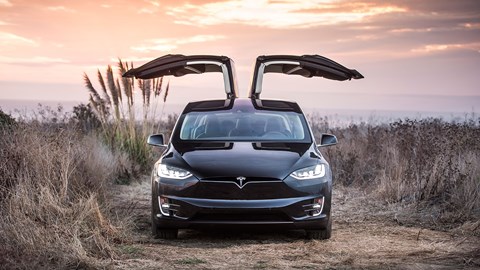
Pros: Unique styling, impressive tech, cavernous space
Cons: Ostentatious doors, questionable quality
Tesla’s ludicrous 0–60mph times aren’t limited to its smaller cars. Even the tank-like, two-and-a-half tonne Model X Plaid SUV posts a time of just 2.5 seconds. That’s mostly because it shares the same tri-motor powertrain as the Model S Plaid (above), which kicks out an impressive 1006bhp. Top speed is 163mph.
Because it’s an enormous SUV, it’s a bit more practical than the Model S. It has a big boot, and it’s a true seven-seater. Plus, it has a maximum range of 333 miles, which means your day trips needn’t be confined to the city. Then there’s Tesla’s spectacular ‘falcon-wing’ rear doors, which will never fail to cause a scene when dropping the kids off at school.
To find out more, read our full Tesla Model X review
Nio EP9
Staggeringly quick electric supercar from a fledgling Chinese EV firm
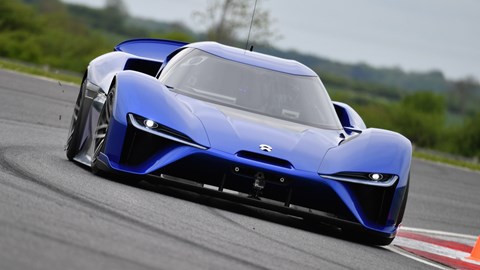
Pros: Corners like a race car, quick-change batteries, brutal acceleration
Cons: Harsh ride, capable of painful G-forces
Nio is well known in Formula E circles – and the EP9 was developed using the expertise gathered from its racing exploits. It’s powered by four electric motors which produce one megawatt of power. That equates to 1341bhp and allows the EP9 to sprint from 0–62mph in 2.7 seconds.
Other impressive performance figures include its 7.1-second 0–125mph time and its near 200mph top speed. Nio also says the car will cover 265 miles on a charge if you’re delicate with the accelerator.
If you’re more generous with your application of the go pedal (and you’re armed with titanium-grade willpower), you’ll be able to motivate the EP9 round the Nürburgring at record-setting pace. Nio claimed a new record for production electric cars at the track in 2017, posting a time of 6:45.9 minutes – a record it defended until the Volkswagen ID.R arrived in 2019.
To find out more, read our full Nio EP9 review
Porsche Taycan Turbo GT
Proof that electric cars don’t need to be lifeless
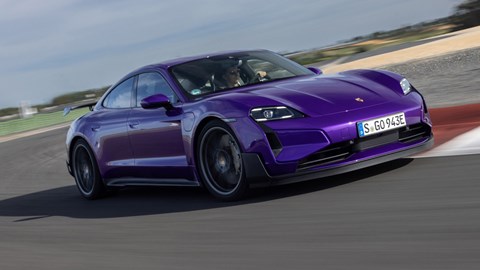
Pros: Clever suspension, great steering, incredibly fast
Cons: It weighs 2.2 tonnes, nervous brakes
Stepping away from electric hypercars for a moment, we have the decidedly more sensible – but still blisteringly quick – Porsche Taycan. Specifically, the facelifted Turbo GT model which boasts a 0–62mph time of 2.3 seconds thanks to its peak power output of 1093bhp, all-wheel-drive and 105kWh battery pack.
Unusually for an EV, the Taycan features a two-speed gearbox. First gear is only used to launch off the line as quickly as possible, while second gear is used the rest of the time.
Plus, unlike most mainstream EVs, the Taycan runs on 800-volt architecture, which means it’s also quick at charging. Find DC rapid charge point capable of supplying 320kW, and it’ll take around 33 minutes to top up the battery from 10 to 80%. Despite the savage performance, maximum range for the Turbo GT is 345 miles. We reckon it’s easily one of the best electric family cars on sale today.
To find out more, read our full Porsche Taycan Turbo GT review
Lotus Evija
Hethel’s answer to the Nevera (which we think has been misrepresented)
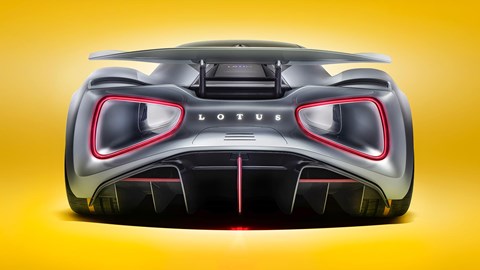
Pros: Motorsport pedigree, lightweight engineering, striking looks
Cons: Still hasn’t entered production, limited range
Yet another member of the sub-three-second club, the Lotus Evija is one of the world’s most powerful road cars. Lotus says it has an output of 2011bhp.
Its four electric motors are fed by a fairly modest 70kWh battery pack, which was developed in partnership with Williams Advanced Engineering. There’s one motor mounted at each corner of the car, sending a little over 490bhp to each wheel.
However, we suspect Lotus is sandbagging when it comes to the Evija’s performance figures. An ‘under three-second’ 0–60mph time and over 200 mph’ top speed seem like conservative estimates given the vast amount of power on tap. We wouldn’t be surprised to see the former figure closer to two seconds and the latter closer to 250.
Lotus also says the Evija will stick to the company’s trademark mantra of ‘adding lightness,’ tipping the scales at a mere 1680kg. In electric car terms, that’s nothing. The brand is also hoping for around 250 miles of range.
Find out more about the Lotus Evija
Rivian R1T / R1S
Practical electric pick-up that just happens to be monstrously fast
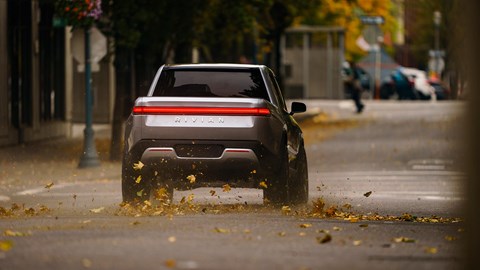
Pros: Massive speed for something so practical, modest price
Cons: Not in the UK yet, quite big for our roads
The Tesla Model X’s size and performance are already incongruous, but electric vehicle start-up firm Rivian plans to push that boundary further. The company’s R1S SUV and R1T pick-up truck (both of which will be based on the same platform) will offer 0–60mph times of 3.0 seconds and pass the 100mph barrier in under seven seconds.
These figures are for the range-topping example of each vehicle, which have 135kWh batteries, ranges of around 310 miles and a total power output of 753bhp. Rivian will also offer a huge 180kWh battery, but this is purely for range instead of performance, with 410 miles and 700 horsepower being the expected figures.
Both are already on sale in the States, with prices starting from a modest $69,000. Rivian also plans to bring its vehicles to Europe, so you could be able to buy one soon.
Find out more about the Rivian R1T
Find out more about the R1 S
Tesla’s smallest performance car gets a boost for its facelift
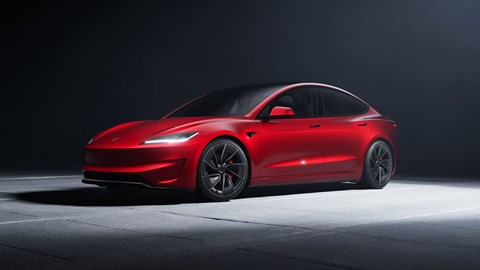
Pros: Clever new suspension, extra power, better aero
Cons: Erm… not a lot that we can see
Tesla has revised the Model 3 Performance – and, boy, have its engineers been busy. This facelifted version get a 32% increase in power and a 16% increase in peak torque delivery, which means it can now get from 0–60mph in just 2.9 seconds and hit a top speed of 163mph.
US customers get 503bhp, but UK buyers will have to make do with just 454bhp. Despite the drop in power on this side of the pond, though, Tesla says the Model 3 Performance’s vital stats won’t change.
Weirdly, straight-line speed isn’t really the point of the car, either. Tesla has tried to make it more of a track toy, by fitting it with some trick adaptive suspension and a new drive mode selector that can tweak everything from the car’s ABS to braking regeneration to make it faster around corners.
And the best part? Prices start from £59,990. You’d be incredibly hard-pressed to find a car that offers more performance for less money.
Find out more about the Tesla Model 3 Performance
Audi RS e-Tron GT
The sensible buyer’s alternative to the Porsche Taycan
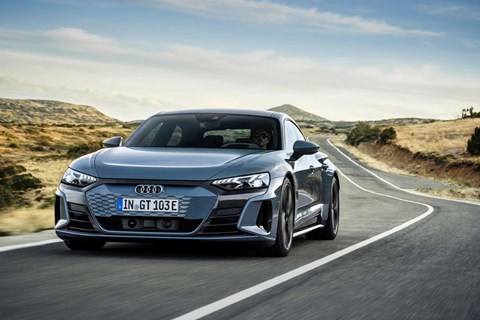
Pros: Long-distance comfort, exceptional refinement, relentless power
Cons: Less fun than the Taycan, RS model feels muddled
We’re calling closing time on this list with the Audi e-Tron GT. It shares the same J1 platform as the Porsche Taycan, but it’s aimed at a slightly different market. It’s geared more towards touring than outright performance, delivering its power progressively rather than in bottomless servings. It’s incredibly comfortable, too.
Don’t let the GT’s softer character fool you, though. It’s still an immensely quick car with a 0–62mph time of 3.3 seconds and a top speed of 155mph. It also has a maximum WLTP range of 283 miles, but if you want more, you can opt for the regular model, which has an official range of up to 296 miles. We wouldn’t bother. We’d rather go fast and charge up more often.
To find out more, read our full Audi e-Tron GT review
What is the fastest 0–60mph electric car?
The current speed king is the McMurtry Spéirling. It can sprint from 0–60mph in a little under 1.5 seconds. However, it’s a track-only race car. The fastest road-legal electric supercar is the Aspark Owl, which can charge from 0–60mph in just 1.69 seconds.
What is the fastest electric car 0–100mph?
There are two contenders. The Aspark Owl can sprint from 0–124mph in 4.76 seconds, while the Rimac Nevera can storm to 100mph in 4.3 seconds. We reckon the two cars would be very closely matched if you lined them up alongside one another.
What electric car goes 200mph?
Browse through this list, and you’ll find loads. There’s the Lotus Evija, Pininfarina Battista and Deus Vayanne. Some electric supercars can beat that benchmark into a pulp, too. The Aspark Owl tops out at 249mph, while the Rimac Nevera and Tesla Roadster can crest 250mph.
What are EVs so fast?
Electric cars have it easier than petrol cars. The powertrains don’t need to climb into the upper echelons on their rev ranges before delivering their peak torque. All of it – and it’s normally a lot – is available from a standstill. Even a run-of-the-mill family car like the Kia EV6 (which is one of our best electric SUVs) can get from 0–62mph in around five seconds. That was hot hatchback territory a few years ago and supercar levels of performance a couple of decades ago.
Luke Wilkinson is a Deputy Editor of our sister site Parkers. However, he also writes news, reviews, features and best of pages for both CAR magazine.